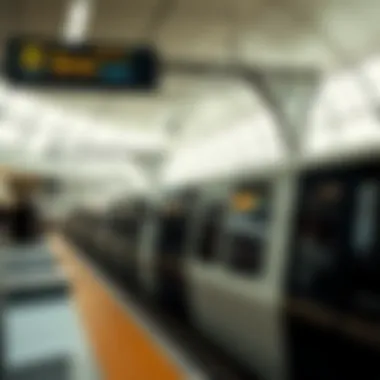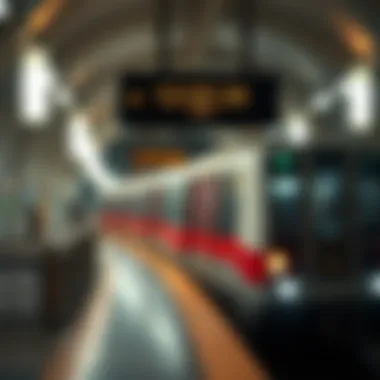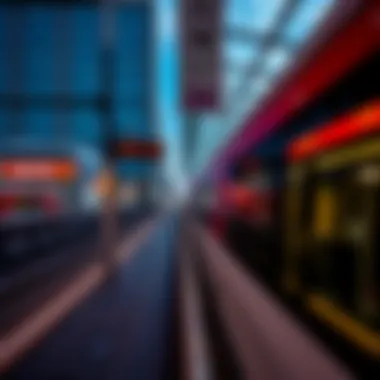Metro Timing in Dubai Today: Essential Insights for Commuters


Intro
Understanding the metro timings in Dubai is more than just a matter of convenience. It’s a crucial element for anyone living in or visiting this bustling metropolis. The Dubai Metro serves as a backbone for urban mobility, connecting various neighborhoods and facilitating easy access to key locations. For investors, real estate agents, and homebuyers, knowledge about the operational hours and efficiency of public transport can significantly influence property choices and investment decisions.
The metro's operational hours can vary significantly based on factors such as the day of the week or special events that may be occurring. Therefore, knowing when the metro runs smoothly can save both time and money, ultimately enhancing the overall commuting experience. Moreover, as we peel back the layers of this topic, we'll dive into how the timings and reliability of the metro system contribute to the broader context of Dubai’s evolving property market, shaping everything from property values to urban development.
By grasping these nuances and implications, readers will not only navigate their day-to-day lives more efficiently but also understand the significant interconnections between the metro and Dubai's vibrant real estate landscape. This comprehensive guide offers insights that cater specifically to investors, homebuyers, and real estate agents—those who are shaping and navigating the ever-evolving skyline of Dubai.
The following sections will detail current market trends in Dubai’s real estate landscape, offer insights into investment opportunities, and underscore the importance of metro timing in the larger fabric of urban development.
Understanding Metro Timing in Dubai
The metro system in Dubai is more than just a mode of transport; it serves as a lifeline for commuters from all walks of life. Understanding the timing of this essential transport option is key, especially for investors, homebuyers, and real estate agents. When one considers real estate in a bustling metropolis like Dubai, the accessibility provided by the Metro often indicates property desirability. Thus, grasping the nuances of metro timing can greatly influence investment decisions and urban planning considerations.
Overview of Dubai Metro System
Launched in 2009, the Dubai Metro system has grown into one of the most advanced urban rail networks in the world. With two main lines—the Red Line and the Green Line—Dubai Metro covers a significant stretch of the city. It connects key areas like Downtown Dubai, Dubai Marina, Business Bay, and the Dubai International Airport.
People rely on the metro for daily commuting due to its efficiency and affordability. The trains run on an automated system, minimizing human error and ensuring a smooth transit experience. Notably, the convenience the metro offers makes it a preferred choice for many, especially during hours of heavy traffic.
One must take into account that the system frequently upgrades its facilities and services, making it a dynamic and ever-evolving mode of transportation. Thus, for anyone looking to invest or settle in Dubai, understanding how the metro operates can open doors to potential opportunities.
Importance of Accurate Timing
Accurate timing of the Dubai Metro is more than a mere timetable; it ensures that thousands of commuters can plan their journeys effectively. Understanding the time slots is vital for several reasons:
- Reliability: Commuters need to show up at the right time to avoid delays that can arise from late trains or overcrowding.
- Investment Decisions: For investors in the real estate market, knowing the operational hours can help in determining property value. Locations near metro stations often experience higher demand, thus impacting prices favorably.
- Commuting Convenience: Aligning personal schedules with metro timings allows for better planning, making travel experiences smoother and less stressful.
- Reduced Carbon Footprint: With a clearer understanding of operational hours, many consider a shift from private vehicles to metro usage, thus contributing to environmental sustainability.
Accurately adhering to the metro timings allows one to capitalize on the efficiency of this transport system, maximizing every opportunity it presents.
By prioritizing informed travel decisions and recognizing the role of metro timing within the broader urban landscape of Dubai, stakeholders can navigate the dynamic market more adeptly.
Current Metro Operational Hours
In any urban environment, understanding the operational hours of public transportation is crucial, and Dubai's metro system is no exception. Knowing when the metro operates can provide significant advantages for individuals navigating this bustling metropolis. The operational hours help commuters plan their journeys, making sure they don’t miss a train, especially during peak times. With this guide, we aim to reveal essential details of the current metro operational hours to enhance your commuting experience.
Weekday Schedule
The weekday schedule for the Dubai Metro operates primarily from 5:00 AM to midnight on Sunday through Thursday. This allows commuters ample time to travel before and after work, catering to the busy schedules of professionals and students alike. During these operational hours, here are some noteworthy considerations:
- Peak Hours: The busiest times generally occur from 7:00 AM to 9:00 AM and 5:30 PM to 8:00 PM. During these periods, trains run more frequently, minimizing the wait time for commuters.
- Frequency: Trains run every two to five minutes during peak hours, while during off-peak hours, the wait can extend to around seven minutes. This frequent service is essential for those dodging the congested roads.
- Rider Assistance: For anyone unsure about their routes or train timings, the metro stations provide information screens showing real-time updates on the service. This is incredibly helpful for first-time users navigating this vast transportation network.
Additionally, during weekdays, proper time management is vital. It’s prudent to arrive at the station a bit earlier to avoid any last-minute rush.
Weekend Schedule
The weekend hours differ slightly, reflecting the changing patterns of commuter traffic. The Dubai Metro operates from 10:00 AM until 1:00 AM on weekends (Friday and Saturday). This adjustment caters to the leisurely pace of the weekend crowd, including tourists and residents enjoying the city’s vibrant atmosphere.
Key aspects of the weekend schedule include:


- Later Start: The later opening time means that the metro accommodates for the Friday prayers, allowing the community to observe this tradition without the pressure of rushing to the next train.
- Service Frequency: On weekends, trains may run on a less frequent schedule, typically every six to eight minutes. However, this is balanced with the increased foot traffic, ensuring that there are still sufficient trains to meet the demand.
- Flexibility: It’s worth noting that with the extended hours, late-night events and gatherings can still be accessed without worrying about transportation.
In summary, understanding the weekday and weekend metro schedules is vital for anyone looking to navigate Dubai efficiently. Being mindful of the operational hours allows commuters to travel with ease, whether they're heading to work or enjoying a weekend out.
“Plan your commute wisely; missing the train can lead to more than just a wait.”
For more detailed information on the Dubai Metro, visit: Dubai Metro - Official Website or check out the Wikipedia page on Dubai Metro.
Understanding these operational hours should equip commuters, investors, and residents to maximize their experience while navigating the metro system.
Factors Influencing Metro Timing
Metro systems are complex organisms that require careful synchronization to function optimally. In Dubai, the metro is not only a means of transportation but a vital link that connects different parts of the city. However, several factors can influence metro timing. It is crucial for both commuters and investors to understand these dynamics to navigate the system effectively and predict potential disruptions.
Public Holidays Impact
During public holidays, the metro operates on altered schedules. This means that regular commuters need to adjust their plans accordingly. For instance, after work on public holidays, the rush can be just as significant as any typical weekday, but train schedules may not reflect this increase in demand.
- Shift in Operating Hours: Often, the metro starts later in the morning and can close earlier in the night.
- Increased Passenger Load: Many people may opt to travel for leisure or family gatherings, significantly impacting the number of passengers at various times.
Understanding these adjustments helps to minimize delays and ensures passengers arrive at their destinations without unnecessary stress.
Seasonal Timing Adjustments
Dubai experiences two main seasons—summer and winter—each with its unique characteristics that influence metro operations.
- Summer Adjustments: Due to extreme heat, operational hours may be tweaked for comfort and efficiency; for example, services can start earlier in the morning to accommodate early risers.
- Winter Crowds: Conversely, the cooler months attract more tourists, leading to a spike in ridership. Therefore, increased frequency during peak times might be implemented, especially during festivals or events.
Being aware of seasonal changes can greatly enhance a commuter's experience. Not only does it help in planning the journey, but it also aids in mitigating potential delays and overcrowding.
Special Events and Metro Operations
Dubai hosts a myriad of special events throughout the year, from cultural festivals to major sporting activities. These events have a significant impact on metro operations.
- Extended Hours: For large events, the metro often extends its operational hours or increases train frequency, enabling efficient transportation for attendees.
- Targeted Traffic Management: Metro authorities may implement specific traffic management strategies before and after events, so knowing when these adjustments happen is pertinent for commuters planning their journeys.
"Keeping an eye on local event calendars can reap benefits, ensuring smooth rides and timely arrivals."
To sum up, by being informed about factors influencing timing, commuters can avoid the pitfalls of unexpected delays. For investors, understanding these timings and adjustments also translates into assessing property value effectively; areas with efficient metro access tend to be more desirable during these dynamic periods.
Navigating the Metro Schedule Effectively
Navigating the metro schedule effectively is crucial for anyone relying on this mode of transport in Dubai. Whether you are a daily commuter, an investor checking out potential properties, or a real estate agent catering to clients, being savvy about metro timing can streamline your experience and enhance your overall journey.
Using the metro for travel within the city cuts down on usual road traffic and gets you to your destination without the hassle of searching for parking or dealing with the chaos of cars. Commuting is less about getting to point A from point B; it's about doing so with minimal delay and the assurance that you can plan your day appropriately. So, understanding how to effectively navigate the metro schedule can significantly impact your efficiency.
Using Official Sources for Information
To ensure you have the most accurate and up-to-date information regarding metro timings, it’s essential to rely on official sources. The Roads and Transport Authority (RTA) has a dedicated website and mobile app that provide real-time updates about the metro operational hours. Utilizing official channels for information ensures that you minimize uncertainty and avoid disruptions in your plans.
Key features to consider when using official sources include:


- Live train updates: Check how late a train may be or if it’s even on schedule.
- Service alerts: Any unexpected issues can be flagged here, which are crucial if you're on a tight schedule.
- Holiday schedules: Keep an eye on specific timings during public holidays when services might differ from regular hours.
To access the official RTA website, click here: RTA Official Website.
Apps and Tools for Real-Time Updates
In today’s technology-driven world, several apps can assist you in keeping track of metro timings effectively. Aside from the official RTA app, third-party applications, such as Google Maps and Citymapper, provide added layers to your journey planning.
Top Apps and Their Features:
- RTA Dubai
- Google Maps
- Citymapper
- Offers detailed schedules and notifications on service updates.
- Provides directions that compare various travel modes, including metro, and gives real-time updates on train schedules.
- Features user-friendly interface and includes multi-modal transport options, letting you know the fastest way to commute.
Using these apps can greatly improve your travel experience. They not only save time but also give you the freedom to make informed choices, especially useful when you need to make adjustments on the go. For those investing in real estate or exploring property options, understanding and effectively using these tools enhances both personal experience and professional outlook.
The Role of Metro in Dubai's Urban Development
The role of metro in Dubai's urban development extends far beyond just providing a mode of transportation. It has become a backbone for the city's growth, influencing patterns in real estate, accessibility, and overall urban planning strategies. The introduction of this extensive metro system not only facilitates smoother transit but has also transformed the landscape of communities and their economies. This section explores two critical aspects: accessibility's impact on property values and how metro lines intertwine with other modes of transport to create a cohesive urban environment.
Metro Accessibility and Property Values
Access to the metro directly correlates with increased property values, an effect deeply felt across various neighborhoods in Dubai. Properties within proximity to metro stations are often seen as more desirable, leading to a noticeable uptick in real estate demand. For instance, neighborhoods like Dubai Marina and Burj Khalifa have witnessed spiraling property prices, partially attributed to their easy access to the metro network.
Here are a few points that highlight this relationship:
- Premium Pricing: Homes close to metro stations often command higher prices. Buyers are willing to pay more for increased convenience and reduced commuting times.
- Investment Appeal: Investors see metro-adjacent properties as attractive opportunities. These locations often enjoy a higher rental yield, making them appealing for buy-to-let strategies.
- Urban Revitalization: Areas historically seen as less desirable can undergo revitalization simply because they become accessible via the metro. This leads to improved property values as new amenities and services follow suit.
"The metro acts as a catalyst for economic growth, directly affecting property values, accessibility, and demographic changes in Dubai."
The enhanced accessibility brought by the metro system fosters a flourishing real estate market, creating not just housing options but entire vibrant communities where people want to live and work.
Integration with Other Modes of Transport
The metro system in Dubai doesn't operate in isolation; rather, it exists as part of a larger transport ecosystem. The integration with buses, water taxis, and even cycling paths creates a seamless transition for commuters, encouraging people to leave their cars at home and rely more on public transport.
Some important points regarding this integration include:
- Multimodal Connectivity: The metro connects with various bus routes and water taxis, allowing passengers to switch between different modes of transport effortlessly. This not only reduces waiting times but also improves the overall commuting experience.
- Centralized Hubs: Strategic metro stations serve as central hubs where multiple transport lines converge. For example, the Burj Khalifa/Dubai Mall Metro Station is linked with buses and taxis, providing easy access to one of the city's prime attractions.
- Support for Sustainable Mobility: By encouraging public transport use and cycling, the metro system contributes to lower carbon footprints. This supports Dubai's vision to promote sustainable urban transportation and minimize traffic congestion.
For more information about the Dubai Metro and its connections, you can visit Dubai Metro Official Website or review the Wikipedia page for an overview of this essential transit framework.
Future Considerations for Metro Timing
As Dubai continuously evolves, so does its metro system. Understanding future considerations for metro timing is key for commuters, investors, and city planners alike. This exploration addresses the anticipated changes that affect how efficiently people travel throughout this dynamic city. With expected expansions and emerging technologies, the operational hours and service quality of the metro will likely see significant enhancement.


Planned Expansions and Their Impact
The Dubai Metro isn't just a convenient way to get from point A to B; it's an integral part of the city’s urban vision. Planned expansions, like the addition of new lines or extensions of existing routes, aim to serve growing neighborhoods and areas ripe for development.
These expansions are designed to:
- Increase Accessibility: More routes will open doors for more residents. Areas once considered too far for a daily commute will become accessible.
- Enhance Property Values: As the metro connects more communities, the desirability of those locales often rises. Investors should pay attention here; properties near a metro station typically see increased demand, which can bump up prices effectively.
- Reduce Traffic Congestion: Fewer cars on the road means less traffic. The metro expansions are a step towards achieving this goal, which can make the overall commuting experience better.
By planning thoughtfully, the Dubai government aims to build not only a transit network but also a lasting infrastructure legacy. This foresight ensures that public transport keeps pace with the rapid growth of the city.
Technological Innovations in Service Delivery
In the modern age, where tech drives nearly every industry, the metro system in Dubai is no exception. Future advancements in technology promise to significantly impact service delivery. The use of smart systems in managing schedules, maintaining trains, and enhancing user experiences is on the horizon.
Innovations include:
- Real-time Tracking: Commuters will be able to track trains in real-time via apps. This immediacy allows for better planning and reduces the downtime associated with waiting for a train.
- Automated Systems: From ticketing to train operations, automation can streamline processes. Automated ticket kiosks and smart gates can make commutes smoother and quicker.
- Mobile Applications: Enhanced apps will not only provide schedule information but also personalized alerts. If you've got a meeting that you can't miss, receiving updates on delays direct to your phone changes the game.
Embracing these technological innovations is not merely about convenience; it holds the potential to increase safety, optimize service efficiency, and ultimately enhance the overall commuter experience in Dubai.
"The future of transit lies not within tracks and trains but in the tech that manages them."
As the metro system continues to adapt to trends and technologies, all eyes are on its impact on urban life in Dubai— the epitome of modern living and innovation.
User Experience and Feedback
User experience in public transport systems like the Dubai Metro plays a crucial role in shaping commuter satisfaction and efficiency. The way riders interact with the metro influences not only their daily journeys but also reflects broader trends in urban transit. Positive feedback can enhance public perception, while complaints can highlight areas needing improvement, which can be particularly vital for investors and real estate professionals who closely observe commuter patterns and transport strategies.
Common Complaints and Solutions
Despite its advancements, the Dubai Metro system is not without friction points. Common grievances often revolve around overcrowding during peak hours, delays in service, and sometimes, lack of information during disruptions. For instance, many commuters have expressed frustration over the lack of timely updates when trains are delayed or when the service is impacted by technical issues.
To address these concerns, the Dubai Roads and Transport Authority (RTA) has been proactive. The introduction of real-time tracking apps has made a noticeable difference. Commuters can now study the live positions of trains and modify their travel plans accordingly, reducing wait times significantly. Furthermore, the RTA regularly updates its social media channels, providing instant updates and allowing those using the metro to stay informed.
Some solutions being discussed include increasing the frequency of trains during peak periods and developing clearer signage within the stations to streamline passenger flow. A user-friendly interface on the RTA’s website would benefit both casual users and tourists, ensuring they can navigate the system with ease.
Positive Experiences Shared by Commuters
On the flip side, many commuters have shared glowing reviews about the efficiency and cleanliness of the Dubai Metro. Riders often note the feeling of safety and comfort while aboard. A comfortable experience during their commute can lead to increased productivity levels for those who need to start or end their workday on the metro.
Moreover, with fully air-conditioned cabins and adherence to strict cleanliness standards, the metro presents an appealing alternative to driving in the often congested streets of Dubai. Riders also appreciate the punctuality of the metro services, with many trains operating on time, which enhances their daily planning and overall commuting experience.
"The Dubai Metro is like clockwork – it’s fast, efficient, and I can check the timing on my phone in seconds!"
This kind of positive feedback emphasizes the metro's role not just as a mode of transport but as part of a larger lifestyle choice for residents and expatriates alike. Understanding these experiences allows the RTA and other stakeholders to continue improving and fine-tuning the metro services for everyone involved, thereby increasing user loyalty and community satisfaction.
Finale
In wrapping up our exploration of metro timing in Dubai today, it becomes evident that this topic is not just about train schedules; it revolves around the heartbeat of a bustling city. Metro timing serves as the lifeline for countless commuters, shaping daily routines and by extension, the economic landscape. With a deeper understanding of operational hours and the ebbs and flows dictated by various factors, both commuters and investors can strategize better.
Recap of Metro Timing Insights
To summarize, Dubai’s metro system operates under specific schedules that change from weekdays to weekends, influenced by public holidays and special events. This system ensures that the urban population can rely on an efficient mode of transport. Whether it’s the rush hour blues or the serene weekend rides, the metro accommodates diverse commuter needs. Adjusting schedules around festivals and significant public occasions means that Dubai’s metro is not static; it evolves with its users. The importance of accurate timing can’t be overstated, as it directly correlates to commuter satisfaction and urban mobility.
Implications for Commuters and Investors
For commuters, having a clear grasp of metro timings translates to time management and efficiency, allowing for smooth transit through the city's myriad attractions and business centers. For investors and homebuyers, the proximity to metro stations can often act as a linchpin in real estate decisions. Properties that boast close access to metro stations typically attract higher interest, translating to increased property values. Additionally, understanding potential growth areas linked to metro expansion can provide a significant edge when making investment decisions.















